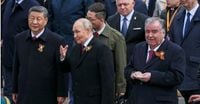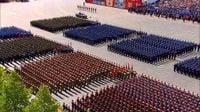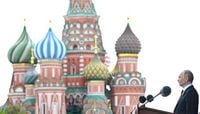On Friday, May 9, 2025, Russia held its annual Victory Day parade in Moscow, commemorating the 80th anniversary of the Soviet Union's victory over Nazi Germany in World War II. This year, the event was marked by the presence of numerous foreign leaders, including Chinese President Xi Jinping and Brazilian President Luiz Inácio Lula da Silva, alongside Slovak Prime Minister Robert Fico, who stood out as the only leader from the European Union to attend.
The Victory Day parade is a significant event in Russia, celebrated with military displays and ceremonies, symbolizing national pride and remembrance of the sacrifices made during the war. Putin's government has used this occasion to project strength and unity, especially amid ongoing military operations in Ukraine. In his speech during the parade, President Vladimir Putin praised the Russian troops engaged in the conflict, stating, "We are proud of their courage and determination, of the spiritual strength that has always led us to victory." He emphasized that the country remembers the lessons of World War II and will not accept any distortions of those historical facts.
Fico's attendance drew criticism from various quarters, including EU High Representative Kaja Kallas, who remarked, "I don't understand Fico at all. Anyone who cares about European values should be in Ukraine today, not in Moscow." Despite warnings from Brussels, Fico asserted, "No one can tell me where to go or not to go," underscoring his defiance against EU directives regarding relations with Russia.
In addition to Fico, Serbian President Aleksandar Vučić also visited Russia shortly before the parade, marking his first trip since the onset of the Ukraine conflict. His presence, like Fico's, was met with skepticism from EU officials, who cautioned that such visits could undermine Serbia's aspirations to join the bloc.
Putin's interactions during the parade included greetings with military officers and a notable embrace with North Korean officials, highlighting the Kremlin's efforts to strengthen ties with allies amid international isolation. The parade featured over 11,000 soldiers marching in Red Square, accompanied by military vehicles and aerial displays, including six bombers that left trails of the Russian tricolor in the sky.
While the parade was a show of military might, it also coincided with a precarious security situation, as the Russian Ministry of Defense reported that over 500 drones had been shot down in Russian airspace in the days leading up to the event. Four airports in Moscow were closed, disrupting travel for approximately 60,000 passengers.
In a stark contrast to the celebrations in Moscow, Ukrainian President Volodymyr Zelensky condemned the events as a "parade of cynicism and lies," arguing that Russia has no right to monopolize the memory of the victory in World War II. Zelensky reiterated calls for accountability, stating that Russia must be held responsible for its aggression, akin to the accountability faced by the Nazis.
As the celebrations unfolded in Moscow, international diplomatic efforts continued. Reuters reported that the U.S. and European nations were working on a proposal for a 30-day ceasefire between Ukraine and Russia, with potential sanctions looming if Moscow rejected the offer. German Chancellor Friedrich Merz indicated that the ball is now in Russia's court regarding this truce, emphasizing the need for serious peace negotiations.
Meanwhile, the Netherlands has expressed interest in hosting a special tribunal to prosecute Russian aggression against Ukraine, a move that aligns with the sentiments expressed during a meeting of European ministers in Lviv, Ukraine, where the establishment of such a tribunal was approved.
On the ground, however, the situation remains tense. The Ukrainian military reported 80 attacks by Russian forces despite the unilateral ceasefire declared by Moscow for the Victory Day celebrations. Ukrainian officials have accused Russia of violating its own declared truce, which has led to further escalations along the front lines.
In response to the ongoing conflict, Ukraine has also introduced sanctions against a Chinese company and several Iranian firms, reflecting its stance against nations perceived to be supporting Russia's military efforts. These sanctions were part of a broader strategy to counteract foreign support for Russia while seeking to strengthen Ukraine's own military capabilities.
As the day concluded with fireworks in Moscow, the symbolic significance of the Victory Day parade was underscored by Putin’s remarks about unity against Nazism and the importance of historical memory. He stated, "Russia has been and will always be an unyielding barrier against Nazism, Russophobia, and anti-Semitism. Truth and justice are on our side." This rhetoric serves not only to rally domestic support but also to frame the ongoing conflict in Ukraine as a continuation of the fight against fascism.
In the aftermath of the celebrations, the international community remains watchful, with various leaders, including U.S. Deputy Vice President JD Vance, asserting that Russia cannot expect to retain territories it has not conquered. As diplomatic efforts for a ceasefire continue, the situation in Ukraine remains fluid, with both sides navigating the complexities of war, politics, and international relations.
The events of May 9, 2025, highlight the ongoing tensions between Russia and the West, with the Victory Day parade serving as a stark reminder of the historical narratives that shape current geopolitical dynamics. As the world watches, the future of Ukraine and its relations with both Western allies and Russia hangs in the balance, with calls for accountability and peace echoing across the continent.






